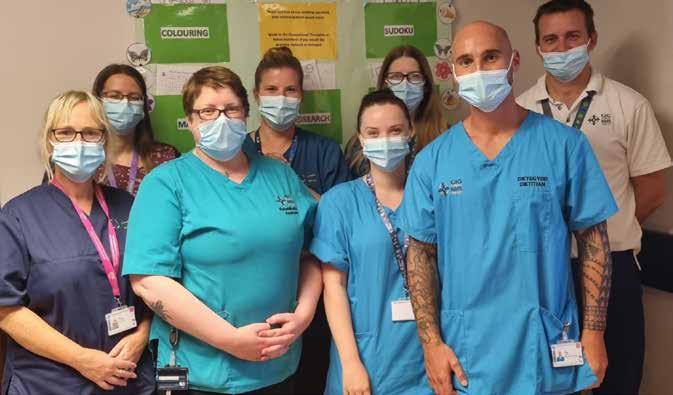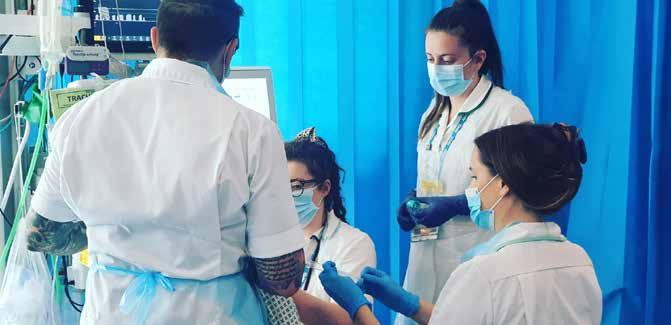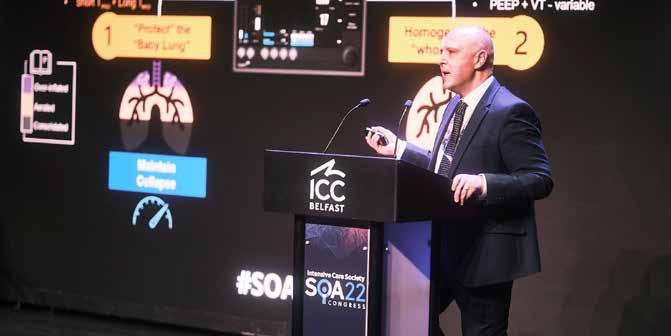











This strategy was created and designed collaboratively to implement an ambitious vision to grow the Intensive Care Society. We want the strategy to enable us to deliver quality services and products that meet the changing needs of today’s and tomorrow’s members and our wider beneficiaries. We also want to ensure the strategy enables us to fulfil our charitable object and is underpinned by an efficient, effective and economical infrastructure.
We developed this strategy with the input of a wide range of interested parties and using a variety of engagement methods including workshops, focus groups, interviews and surveys.
We are a small organisation and we rely on collaboration between staff and volunteers to enable us to deliver our activities. Together this enables the Society to punch well above our weight and support a wide range of activities to make an impact and advance and promote the care and safety of critically ill patients.
We are grateful to everyone for the time they have given to develop the strategy and we look forward to continuing to work with you as we deliver it together over the next five years.
Thank you.
Dr Steve Mathieu President Intensive Care Society Dr Sandy Mather Chief Executive Intensive Care Society Dr Stephen Webb Immediate Past President Intensive Care Society
Dr Stephen Webb Immediate Past President Intensive Care Society


The Society’s vision is a world where every member of the multi-professional intensive care team is able to deliver the best quality of care for those who need it, when they need it.
To be the voice of the multi-professional intensive care community, their patients and their loved ones and together to advance and promote best quality care, safety and research.
We work with others to maximise our impact
We are bold in our actions and words and encourage diversity of views
We treat everyone with dignity and respect, and accept differences delivering our mission more effectively.
We provide value by delivering services and products to a consistently high standard.
Our foundation is our diverse multiprofessional membership. Together we are able to make a difference to advance and promote the care and safety of critically ill patients.
We value diversity and will seek to reflect that in our membership and ensure we use evidence based methods to seek and engage people in under-represented groups within our community.
We will continue to create opportunities for members to gain experience on our committees or working groups and encourage them to seek election to our professional advisory groups and Council.
Our Equality, Diversity and Inclusion (EDI) workstream is based within our Professional Affairs Division which delivers our goals about workforce, but it’s also a cross-cutting theme within the Strategy and is designed to ensure the Society considers EDI in all our charitable activities.
We rely on the advice and support we receive from patients who have received intensive care, and their loved ones, to help develop our research, policy making, standards and education. We have a growing number of people with experience of intensive care who also fundraise for the Society running campaigns to raise income for our charitable activities.
We will continue to modernise our governance infrastructure to function as a modern, agile Society.
We will further diversify our income streams so that the Society continues its trajectory of growth while maintaining good fiscal control.
Our public fundraising will be strengthened and enhanced by increased engagement with the public and by growing our relationships with philanthropists and high net worth donors. This will enable us to increase our annual unrestricted fundraising income to £500,000 per year by 2027.
We will continue to seek donor funding support from trusts and grant giving bodies to co-fund some of our core charitable activities including infrastructure costs for the charity to employ core staff and run education and leadership training for our members.
We will publish our sustainability policy. We will measure our carbon footprint by the beginning of 2023 and implement changes and improvements in our systems and processes to achieve a 50% reduction in our carbon footprint by 2030. We will champion sustainability in the way we run our own organisation and manage and deliver our activities and events. In addition, we will support our intensive care community to achieve NHS sustainability targets.
By 2027:
Linked with at least three other intensive care organisations to grow the annual celebration that is Intensive Care Week
Using our APPG on Intensive Care and political exposure we will have embedded a national policy on the advancement of intensive care rehabilitation services and follow up clinics
Considered the options and benefits to the Society and our beneficiaries of seeking a Royal Charter
By Dec 2023
Raise the profile of the APPG for Intensive Care and host at least one key stakeholder holder event to influence policy Develop a fully scoped out and costed project for the Society to deliver its role providing evidence within relevant modules of the UK COVID-19 Inquiry Embed at least one national policy that represents the whole multi-professional team and enables them to thrive at work
Expanded our exposure in the political landscape advising Government on key elements that improve and advance intensive care and promote better patient care
Fill the policy gap on rehabilitation to better support patients and the multi-professional workforce to ensure appropriate transitional care immediately after leaving the unit
Working with media and production companies to ensure that the way they depict intensive care in TV and film is factually correct
By Dec 2025
Building on our last documentary, collaborate with a production company to produce a six-part series telling the story of working in intensive care
Build a range of assets/stories growing awareness of intensive care and the importance of our work to help educate parliamentarians and key decision makers
To be an influential leader and the voice of our multi-professional intensive care community, their patients, families and loved ones
To be a key source of expertise and information to policy makers and the wider healthcare system on all aspects of intensive care
Collaborate with like-minded organisations and Parliamentarians to hold a series of public debates to increase understanding about the interface between intensive care, palliative care, and end of life care and other relevant topics
By December 2024 to have completed a submission for our triennial request to Her Royal Highness the Princess Royal to extend her Patronage of the Society
By Dec 2027
Build an AHP alliance with likeminded bodies to bring their intensive care sub committees together as a community of practice to have one unified approach to shared learning and making significant change
Develop a network between the Society, NHS Trust and hospital CEOs, NHS England and Health Bodies, and other key stakeholders to ensure we promote best practice, latest developments and all other current affairs within the intensive care landscape
Develop the options and rationale for Trustees to consider whether to submit a petition for a Royal Charter
By 2027:
We are the goto organisation for intensive care patient information with at least 60% UK wide coverage within ICUs
By Dec 2023
Support our Patients, Relatives and Public Advisory Group (PRPAG) to provide clear navigation to sources of information already available, and to fill the information gaps to develop materials for patients, their loved ones and the public
Create an awareness campaign around the variety of intensive care professionals and their roles on the unit and during rehabilitation
To establish a community of people with experience of intensive care to support our PRPAG and inform our future work
Launch a patient portal on the Society’s website with educational assets and signposting for patients, their loved ones and to gain public support
By Dec 2027
Scope out the options of holding a celebratory thank you event for patients and relatives who have raised funds for the Society (linked to existing events eg ICS Awards, SOA as a satellite session, or alternate)
To be the main source of information for patients, their loved ones and the public regarding intensive care
By 2027:
Our renewals and membership joining processes will be smooth and simple Our membership profile will be diverse, reflecting every region of the UK as well as the diversity and professional profile of staffing in intensive care
Our retention rate will consistently be 90% or above for all membership categories
Grow membership to 4000
By Dec 2023
Improve the membership journey from joining as a new member, to amending membership profiles and renewing each year
Make the membership survey more engaging so members feel able to provide feedback, and can see how their voices help shape the Society
Enhance the website user journey so that members can always find exactly what they need when they need it
Refine our digital infrastructure to meet the future needs of our membership
Establish a process and criteria for the allocation of membership discounts for those working less than full-time
Implement rolling 12 month memberships based on the date members join the Society
Scope out the costs and risks/benefits of offering membership via monthly direct debit Review our membership categories and fees, including the breadth of categories available to the expanding workforce
Grow our membership by delivering quality products and services that support current and future members of the intensive care community
To develop our membership value so that the Society is seen as an essential choice for anyone working in intensive care
Empower staff to provide great member support at the point of contact, to better assist members with queries and build closer relationships between us and our members

Refine our membership value statement and member benefits based on the results of our membership survey
Improve engagement with all intensive care professions to provide better member value and increased recruitment and retention
Develop the CRM to provide regional, diversity and profile data to target those underrepresented in our membership
Evaluate options for corporate membership of the Society for industry representatives and key external stakeholders
Review options for incentivising member recruitment, for example through educational events
Successfully target under-represented professions and locations and expanded membership in these areas
Recruit champions from various professions and locations to help us reach the goal of a truly regional and representative membership
Consolidate our membership benefits (what we do for our members) based on membership survey data from previous four years
Our elected Council reflect the professions and other attributes of our members including diversity in gender, ethnicity and region
By 2027:
New intensive care staff will see the Society as their natural home, and will have the support they need to help them plan their career and goals

We will have established highly regarded coaching and networking programmes for those working in intensive care
Enabled at least 10% of our membership to benefit from leadership resources (including one day and half day training face to face and virtual)
Establish three additional sub-committees to deliver the work of the Professional Affairs Division:
• Workforce Development
• Membership Services
• Nominations and Awards
Develop a sustainable funding model for our nine month, annual multi-professional leadership programme (LeaP)
Scope the potential for LeaP alumni and mentoring
Developed a series of modular leadership training for aspiring managers: Aspire to Lead
Maintain the Peer Support training programme
Scope the potential for doctor in training Peer Supporters
Refresh the Wellbeing programme into the Thriving at Work programme offering workforce skills training workshops and workforce webinars
Scope out options for development programmes for specific groups of our members
Scope out options for developing a mentorship framework and network
Publish the results of our first survey by the Equality, Diversity and Inclusion Working Group and develop an action plan in response with clear targets for delivery
To support the development of the intensive care workforce of the present and future, no matter their career stage or goals
Conduct a workforce survey and determine what career support is currently required for those working in intensive care
Expand our existing leadership programme, and ensured it is accessible, not just available, to people from all professions
Establish regular networking events and knowledge exchange opportunities (outside of SOA and existing groups) for each professional group in our membership
Use our existing platforms and relationships to advocate for capacity and capability of the intensive care workforce, both current and future
Establish a framework or similar tool to support the multi-professional team to develop their workforce at a local level and with respect to their individual professions
Advocate the diverse careers in intensive care to attract staff to the multi-professional team, from both inside and outside healthcare

Provide a platform for staff entering careers in ICU to connect with mentors and coaches who can help them develop their careers
Explore options for support and resources specifically for financial planning for various stages of ICU careers
Incorporate a framework tool for multi-professional team workforce development into the most recent version of GPICS
By 2027:
GPICS Version 3 + audit toolkit launched
Developed an audit toolkit and implementation support to routinely accompany the guidelines the Society produces for end users
By Dec 2023
Maintain sufficient capacity and capability to continue work on a maximum of eight guidelines annually while also developing the quality improvement function
Implement a plan to review and revise existing ICS guidelines and standards
Agreed a plan to assess proposals and implemented a prioritisation process for new guidance, engaging the membership and wider critical care community to avoid duplication
Pilot a system with at least 2 sets of guidelines to survey their use and impact on patient care and clinical practice
Continue to lead on ICU staffing standards across the UK using GPICS
Continue to collaborate with NHS England and devolved nations including the findings from the GIRFT programme to address gaps and variance
Launch and promoted Version 3 of the Guidelines for the Provision of Intensive Care Services (GPICS)
Disseminate our Guidelines for the Provision of Intensive Care Services V3 audit toolkit alongside the guidelines’ publication
Establish a process whereby new and updated guideline is accompanied by an audit toolkit to review implementation in practice

Scope out a plan with costs, risks/benefits for developing an online system to assess compliance with guidelines
Include patient, loved ones and carer advice within guidance, on the Society’s website and clearly signposting to other support organisations
Review and update our processes to handle, review and endorse external guidelines and standards
Ensure inclusivity and multi-professional working within standards and guidelines
Develop a system to periodically assess compliance against guidelines produced to understand the impact of the Society’s work
By 2027:
Improved the capacity and diversity of the Society’s Journal team and Research Division
To have secured an increased Impact Factor for the Journal of the Intensive Care Society (JICS)
To have delivered the Society’s annual and biannual grant giving to grow the research capacity of the intensive care community
By Dec 2023
Review the diversity of our awards panels to ensure they are representative of our membership

Review the number, makeup and diversity of the Journal’s Associate Editors and Reviewers to ensure appropriate capacity and representation
Develop a plan to review and implement the NIHR diversity initiatives and support the race equality framework
Work with PAGs, critical care special interest groups and others to amplify the message about the Society’s research awards being open to all those who work in intensive care regardless of profession
To advocate for protected time for critical care staff to engage in research Commence the process to re-tender for the publishing house for the Journal of the Intensive Care Society (JICS) to test the market and negotiate a contract that is value for money and ensures compliance with Plan S by December 2024
Develop a plan to increase citations and therefore, the likelihood of a successful application for an Impact Factor for Journal of the Intensive Care Society (JICS)
To champion quality intensive care research across the multi-professional team supporting all intensive care units to become research-active
To provide research training and research mentorship opportunities to support new and emerging researchers across the multi professional membership
To commission and prioritise research to inform new and revised standards
To promote the importance of recruiting patients, families and the public into critical care research activities
To fund research about the rehabilitation needs and wider outcomes of an intensive care stay
To ensure sustainability is a key focus and plays a role in all research grant programmes
To advocate for stronger cross border research working noting legislative, contractual and funding challenges
To complete the transition to a new Publishing Contract and have implemented the plan to increase citations ready for application for an impact factor for the Journal of the Intensive Care Society (JICS)
To support data gathering to demonstrate improving patient and family outcomes, particularly longer-term outcomes
To launch regular collaborative grants and awards and increase multi-professional award recipients
To apply for an Impact Factor for the Journal of the Intensive Care Society (JICS)

By 2027: The majority of content is digital and supported by onsite workshops, hands-on sessions and networking events
Recurring annual programme of sustainably funded educational events
25% of members are regularly using the Learning portal and 200 non-members are buying content from the Learning portal
By Dec 2023
Deliver eight hybrid study days or workshops on a not for loss basis ensuring a financial contribution back to the charity and with delivery focussed around Autumn, Winter and Spring (none within the two months prior to SOA)
Review and restructure our Learning Management System to enable ease of access for users
Create twelve short online videos or podcasts for the learning portal
Create a pilot online module aimed at beginner, intermediate and advance in ventilation
Collaborate with two organisations to produce educational activities
Develop a Society accreditation system as a kitemark of quality CPD for courses
By Dec 2025
Create profession-focused online modules on ‘what you need to know when you step into an ICU’
Create three topics with online modules for beginners, intermediates and advanced levels aimed at the whole multiprofessional team
Develop three learning partnerships to create annual learning activities
By Dec 2027
Establish a growing annual programme of financially sustainable blended learning relevant across the multi-professional team
Create a structure for topics to be delivered in a modular format with online modules aimed at beginners, intermediates and advanced levels
To grow our multi-professional blended learning combining the best of digital and face-to-face experiences
By 2027: Developed accreditation processes in at least one other topic as well as ultrasound
Increased the uptake of FUSIC by the wider multi-professional intensive care team by 50% from 2022
By Dec 2023
Implement systems to ensure that FUSIC data are accurately recorded and stored within a fully functioning database, capable of providing the necessary accreditation reports
Develop new and improved systems and processes to support mentors and supervisors to maintain their competence and to ensure a quality learning experience
Provide support initiatives for FUSIC candidates and mentors, such as how to remotely mentor candidates
Develop the first train-the-trainer webinar and course, to be run alongside a basic training course
Fully implement CACTUS (paediatrics) and Focussed Ultrasound in Intensive Care (FUSIC) HD modules
Champion the use of FUSIC to the wider multi-professional community Review processes for remote mentoring – including scoping the options for endorsing existing software system providers
Scope out the options for a new accreditation programme eg in ventilation
Scope out the options for a new accreditation in electroencephalogram (EEG) for ICU
Secure intellectual property across all areas of the Society’s accreditation offers
By Dec 2025
Provide the evidence base for ultrasound to be added to the FICM curriculum as an optional module
Develop all Focussed Ultrasound in Intensive Care (FUSIC) online content into interactive modules
Improve accessibility to ultrasound for the whole multi professional team
Launch one international Focussed Ultrasound in Intensive Care (FUSIC) accreditation pilot
Develop at least one new accrediation programme. eg ventilation
By Dec 2027
Launch two international Focussed Ultrasound in Intensive Care (FUSIC) accreditation pilots
To build on our multi-professional accreditation programme expanding our services to enable competence in other subject areas
By 2027:
The Congress attracts over 2000 delegates (in-person and virtual) comprising the whole multi-professional community
SOA has had a 30% carbon footprint reduction Completed the transition to an inhouse events team to lead the delivery of SOA and achieve financial sustainability and work on a not for loss basis to support the growth of the Society’s charitable activities
By Dec 2023
Increase the quality of targeted and timely marketing and improved delivery of SOA Improve the delegate experience by a new model of collaboration between Society staff and the professional conference organiser
Create an engaging annual pre-congress workshop programme that enriches the delegate experience of SOA and is delivered on a not for loss basis
Revise the ticket pricing structure and financial model for SOA maintaining value for money whilst providing equality, diversity and inclusion alongside long term financial sustainability
Develop a business case and staffing structure to set out phase 2 of the transition plan to deliver SOA by an inhouse Events team on a not for loss basis
Improve our virtual packages to attract and enable increased global attendance year-on-year
Develop a partnership initiative to increase attendance from likeminded organisations
Develop a rolling five year plan for SOA venues booked in advance to ensure maximum value for money
For SOA to be the leading Congress based on educational content, professional development opportunities and networking for those involved in critical care
To secure year on year growth of the annual SOA congress led by an in-house events team to ensure its financial sustainability
Complete phase 3 of the transition plan to deliver SOA by an in-house events team on a not for loss basis
Create member value and engagement incentives to increase membership to attend SOA
Develop an international initiative which has allowed us to engage with the global community reflected in a 20% increase in global delegates accessing SOA



Establish stronger links with UK hospitals to champion the importance of supporting staff to accessing SOA
Scope out the options and business case to collaborate on the delivery of SOA with one European/International Intensive Care Society



“We are grateful to everyone for the time you have given to help develop the strategy and we look forward to continuing to work with you as we deliver it together over the next 5 years.”